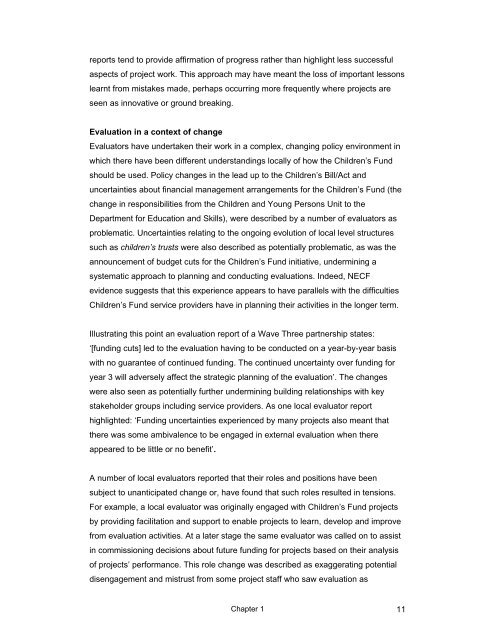Local Evaluation of Children's Services Learning from the Children's ...
Local Evaluation of Children's Services Learning from the Children's ...
Local Evaluation of Children's Services Learning from the Children's ...
- No tags were found...
You also want an ePaper? Increase the reach of your titles
YUMPU automatically turns print PDFs into web optimized ePapers that Google loves.
eports tend to provide affirmation <strong>of</strong> progress ra<strong>the</strong>r than highlight less successfulaspects <strong>of</strong> project work. This approach may have meant <strong>the</strong> loss <strong>of</strong> important lessonslearnt <strong>from</strong> mistakes made, perhaps occurring more frequently where projects areseen as innovative or ground breaking.<strong>Evaluation</strong> in a context <strong>of</strong> changeEvaluators have undertaken <strong>the</strong>ir work in a complex, changing policy environment inwhich <strong>the</strong>re have been different understandings locally <strong>of</strong> how <strong>the</strong> Children’s Fundshould be used. Policy changes in <strong>the</strong> lead up to <strong>the</strong> Children’s Bill/Act anduncertainties about financial management arrangements for <strong>the</strong> Children’s Fund (<strong>the</strong>change in responsibilities <strong>from</strong> <strong>the</strong> Children and Young Persons Unit to <strong>the</strong>Department for Education and Skills), were described by a number <strong>of</strong> evaluators asproblematic. Uncertainties relating to <strong>the</strong> ongoing evolution <strong>of</strong> local level structuressuch as children’s trusts were also described as potentially problematic, as was <strong>the</strong>announcement <strong>of</strong> budget cuts for <strong>the</strong> Children’s Fund initiative, undermining asystematic approach to planning and conducting evaluations. Indeed, NECFevidence suggests that this experience appears to have parallels with <strong>the</strong> difficultiesChildren’s Fund service providers have in planning <strong>the</strong>ir activities in <strong>the</strong> longer term.Illustrating this point an evaluation report <strong>of</strong> a Wave Three partnership states:‘[funding cuts] led to <strong>the</strong> evaluation having to be conducted on a year-by-year basiswith no guarantee <strong>of</strong> continued funding. The continued uncertainty over funding foryear 3 will adversely affect <strong>the</strong> strategic planning <strong>of</strong> <strong>the</strong> evaluation’. The changeswere also seen as potentially fur<strong>the</strong>r undermining building relationships with keystakeholder groups including service providers. As one local evaluator reporthighlighted: ‘Funding uncertainties experienced by many projects also meant that<strong>the</strong>re was some ambivalence to be engaged in external evaluation when <strong>the</strong>reappeared to be little or no benefit’.A number <strong>of</strong> local evaluators reported that <strong>the</strong>ir roles and positions have beensubject to unanticipated change or, have found that such roles resulted in tensions.For example, a local evaluator was originally engaged with Children’s Fund projectsby providing facilitation and support to enable projects to learn, develop and improve<strong>from</strong> evaluation activities. At a later stage <strong>the</strong> same evaluator was called on to assistin commissioning decisions about future funding for projects based on <strong>the</strong>ir analysis<strong>of</strong> projects’ performance. This role change was described as exaggerating potentialdisengagement and mistrust <strong>from</strong> some project staff who saw evaluation asChapter 1 11
















